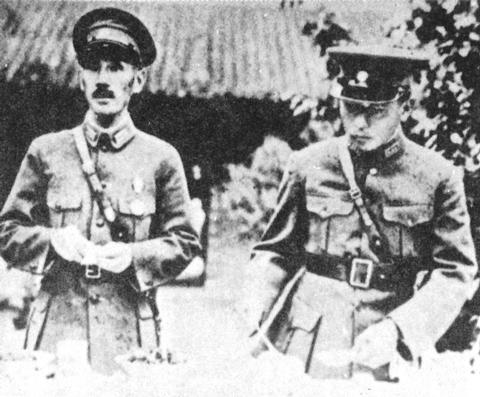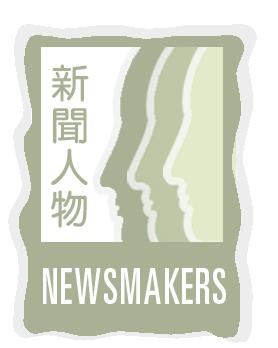"Young Marshal," the embodiment of China's struggles, died yesterday at the age of 101.
Like Madame Chiang Kai-shek (蔣宋美齡), who is 104 and still lives in the US, Chang Hsueh-liang (張學良), or the "Young Marshal," was both a survivor of and key participant in the revolutionary struggles that gripped China in the early half of the last century.

TAIPEI TIMES FILE PHOTO
Chang, who spent more than half a century under house arrest, died yesterday in Honolulu at the age of 101. Leaders on both sides of the Taiwan Strait expressed their condolences yesterday. These included Taiwan's President Chen Shui-Bian (陳水扁), his Chinese counterpart Jiang Zemin (江澤民), Taiwan's premier Chang Chun-hsiung (張俊雄) and KMT chairman Lien Chan (連戰).

"I don't have much praise for his role in history," commented professor Chen Yung-fa (陳永發), a historian and researcher at the Academia Sinica. "As a person, he was fine, but as a politician, he was too naive," Chen said.
Chang was born on June 4, 1901 in Liaoning province. In 1928, his father Chang Tso-lin (張作霖), known as the "Old Marshal" and the most powerful and influential warlord in Manchuria, was seriously injured in a Japanese assassination attempt. He died on June 4 of that year -- the younger Chang's birthday.
From then on, the Young Marshal always celebrated his birthday at the end of May, rather than June 4.
A military life and a complex love life
Chang's story is one of military leadership, political intrigue and a somewhat complex love life in which he eventually found a soulmate in Edith Chao (
He was married to Yu Feng-chih (于鳳至) in 1916 in a marriage arranged by his father.
But in 1922, Chang met the 18-year-old Gu Rei-yu (谷瑞玉), daughter of a businessman in Tianjin, and married her in 1924. The Old Marshal later tacitly acquiesced to this second marriage, but his first wife never accepted it.
Relations between Chang and Gu gradually deteriorated, however, and they separated in 1927. They divorced in 1931. Gu had never been allowed to live in the Changs' family residence in Shen-yang.
Edith Chao, daughter of a vice minister of transportation, was born in Hong Kong in 1912. At the age of 16 she fell in love with the Young Marshal at first sight when they met at a ballroom dance in Tianjin.
In 1929, Chao left her family home to live with Chang, despite the fact that he already had two wives. Humiliated by his daughter's shocking move in the extremely conservative society of the time, Chao's father published a statement in a newspaper to declare that Edith Chao was no longer his daughter.
From then on, Chao and Chang remained together until Chao died last year at the age of 88.
After Chang's father had died, the Japanese took political control of Manchuria as a springboard from which to invade China.
As the leader of the Manchurian army, with hundreds of thousands of soldiers under his command, Chang Hsueh-liang realized that his army alone was still too weak to fight the Japanese. In 1928, he decided to submit to the Nationalist government under Generalissimo Chiang Kai-shek's (蔣介石) leadership, with the goal of uniting the divided military forces under the command of warlords in different parts of China.
When Japan invaded Manchuria in 1931 Chang withdrew his troops from northeast China and immediately left the three provinces of Manchuria in Japanese hands, in accordance with Chiang's "no resistance policy." He became known as "the general of no resistance."
Chiang seemed to be reserving his military force to crack down on communists. But Chang regarded the Japanese as the real enemy.
In 1934, Chiang ordered Chang to crack down on the communists. During these battles the Manchurian army suffered heavy losses and many defeats, which deepened Chang's differences with Chiang regarding the latter's policy of "suppressing the internal rebellion before resisting the external invasion" (
The xian incident
In 1936 Chang took his opportunity when Chiang paid an inspection visit to Xian. He kidnapped the Generalissimo and forced him to enter into a ceasefire with the communists and form a national united front to fight the Japanese. Two weeks later, after apparently reaching an agreement that fighting the Japanese would now be their priority, Chang released Chiang and accompanied him back to Nanjing, then capital of the Nationalist government. As soon as they arrived, Chang was arrested by the KMT strongman, not to be set free again until 1991.
Chang's move is extolled by China's communist regime as an act of patriotism and the Chinese government has held high-profile celebrations annually on his birthday in his native Manchuria. But right-wing Chinese Nationalists have always condemned him for helping communism to flourish.
"Chang's political ideas were characterized by romanticism. He was too romantic and so harbored many illusions about the communists and he truly believed that they put everything into fighting the Japanese. It was also this romantic weakness which made him think it would be safe to accompany Chiang back to Nanjing after kidnapping him -- just because he was a close ally and knew Chiang so well," said Chen.
Lee Yung-chih (李永熾), professor of history at National Taiwan University, echoed Chen's remarks. "His weakness was his readiness to trust people. No wonder he had such a dramatic life. He too readily believed in the communists' determination to defend China from the Japanese, and was similarly too ready to believe Chiang's promise to fight the Japanese. In fact, both the nationalists and the communists had their own interests in this war," said Lee.
Chang remained under house arrest from immediately after the incident until President Lee Teng-hui (李登輝) began Taiwan's democratization process. He was freed in 1990. In 1991, Chang flew to Hawaii with Chao, and they lived in Honolulu for the rest of their lives.
Chao had remained free but stayed at Chang's side throughout his 54-year-long house arrest. Media reports from Honolulu stated that Chang seemed to have been deeply saddened by her passing last year.
Although his first wife, Yu, left China for the US for medical treatment in 1940, Chao continued to live with Chang as his "mistress" without any legal status to the relationship. But things changed after Chang converted to Christianity, a religion that does not sanction polygamy.
Conversion to christianity
Yu finally decided to divorce Chang in 1964 after Chang wrote her a letter, in which he explained why, as a Christian, he was forbidden to have more than one wife.
In 1964, Chiang and Chao held their wedding ceremony at a small church in Peitou. Chang was 64 and Chao 52.
The Central News Agency has reported that, according to Lu Chi-yu (盧其宇), chairman of the Association of Overseas Chinese from Northeast China (旅美東北同鄉會), Chang rejected offers from Chinese authorities to live in China. Lu said this was because of Chao's life-long stance against communism.
Chang had purchased two burial plots, one for himself and one for Chao, in a cemetery in Honolulu. He was buried there last year.
During his quiet life in Peitou, historians had hoped that he would write a record of the Xian Incident and fill in many of the gaps in their knowledge of the event, particularly with regards to his relationship with Chiang during the two-week kidnapping. With Chang's passing, however, those details will never be known. But Chen Yung-fa feels no pity about that.
"I don't think he had much to say about that. He was right to have remained silent ever since," said Chen.
But Lee Yung-chih thinks his silence was some sort of protest and also a kind of expression. "In fact, his arrest in the first place was ironic. It was best that he remained silent. As far as the historical facts of the incident are concerned, just let the historians guess -- if they are interested," Lee said.

Intelligence agents have recorded 510,000 instances of “controversial information” being spread online by the Chinese Communist Party (CCP) so far this year, the National Security Bureau (NSB) said in a report yesterday, as it warned of artificial intelligence (AI) being employed to generate destabilizing misinformation. The bureau submitted a written report to the Legislative Yuan in preparation for National Security Bureau Director-General Tsai Ming-yen’s (蔡明彥) appearance before the Foreign Affairs and National Defense Committee today. The CCP has been using cognitive warfare to divide Taiwanese society by commenting on controversial issues such as Taiwan Semiconductor Manufacturing Co’s (TSMC, 台積電) investments in the

INVESTIGATION: The case is the latest instance of a DPP figure being implicated in an espionage network accused of allegedly leaking information to Chinese intelligence Democratic Progressive Party (DPP) member Ho Jen-chieh (何仁傑) was detained and held incommunicado yesterday on suspicion of spying for China during his tenure as assistant to then-minister of foreign affairs Joseph Wu (吳釗燮). The Taipei District Prosecutors’ Office said Ho was implicated during its investigation into alleged spying activities by former Presidential Office consultant Wu Shang-yu (吳尚雨). Prosecutors said there is reason to believe Ho breached the National Security Act (國家安全法) by leaking classified Ministry of Foreign Affairs information to Chinese intelligence. Following interrogation, prosecutors petitioned the Taipei District Court to detain Ho, citing concerns over potential collusion or tampering of evidence. The

‘COMPREHENSIVE PLAN’: Lin Chia-lung said that the government was ready to talk about a variety of issues, including investment in and purchases from the US The National Stabilization Fund (NSF) yesterday announced that it would step in to staunch stock market losses for the ninth time in the nation’s history. An NSF board meeting, originally scheduled for Monday next week, was moved to yesterday after stocks plummeted in the wake of US President Donald Trump’s announcement of 32 percent tariffs on Taiwan on Wednesday last week. Board members voted to support the stock market with the NT$500 billion (US$15.15 billion) fund, with injections of funds to begin as soon as today. The NSF in 2000 injected NT$120 billion to stabilize stocks, the most ever. The lowest amount it

NEGOTIATIONS: Taiwan has good relations with Washington and the outlook for the negotiations looks promising, Minister of Economic Affairs J.W. Kuo said Taiwan’s GDP growth this year is expected to decrease by 0.43 to 1.61 percentage points due to the effects of US tariffs, National Development Council (NDC) Minister Paul Liu (劉鏡清) said at a meeting of the legislature’s Economics Committee in Taipei yesterday, citing a preliminary estimate by a private research institution. Taiwan’s economy would be significantly affected by the 32 percent “reciprocal” tariffs slapped by the US, which took effect yesterday, Liu said, adding that GDP growth could fall below 3 percent and potentially even dip below 2 percent to 1.53 percent this year. The council has commissioned another institution